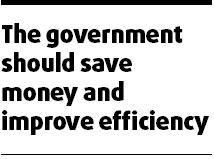Administrative fat trim food for thought
Updated: 2008-01-09 07:32
When judging whether or not a government is satisfactory, the public usually examines the services offered by the administrative, the costs of running these services and the efficiency of the officials performing their duties.
Such common sense standards are deeply rooted in economic theories.
A society entrusts the government affairs of diplomacy, national defense, police, tax and other vital issues to specialized institutions to reduce the overall costs in handling them.

The administrative could carry out public services and manage public affairs at less cost and higher efficiency.
Therefore, the government should save money and improve efficiency to better serve the public.
However, such a theoretical conclusion is not always practiced.
The government always has a strong impulse for expansion, in its staff, its institutional size and its expenditure.
If such impulses go unchecked, the administrative could evolve into a slow and costly institution that hinders economic growth.
According to official statistics, about 37 percent of the money spent by the governments at all levels in 2003 in China was spent on the administrative itself.
About 900 billion yuan ($118.4 billion) is spent on cars owned by the administrative, as well as dinners, entertainment and business trips every year. The construction and maintenance of office buildings, hotels, guest houses and training centers owned by the administrative needs 1 trillion yuan ($131.6 billion) every year. And big sums were spent on meetings, celebrations, receptions and other activities.
If these huge numbers were saved and spent on education, public health, social security, employment promotion and environmental protection, there would be considerable trickle down benefits to the public.
However, before condemning these expenditures, it is necessary to understand the government as an economical entity seeking the biggest interests for itself in the market economy.
In reality, the administrative, the different departments of the government and the civil servants have substantial interests to pursue, including stronger power, higher positions and better pay.
We must acknowledge the legitimacy of the pursuit by the government and its employees after these interests when we try to find solutions to improve efficiency and reduce government costs, while keeping these pursuits at a reasonable level.
It bears a key significance for maintaining the smooth operation of the administrative that the roles of different departments, the functions of the government at different levels and their cooperation should be assigned according to the estimate of their costs and efficiency.
But such an estimate is often forgotten in our current scheme of administration. Some departments are put in charge of affairs with high complexity, each step of which demands real professional management.
The department of social security is such an example. It has to collect money from individuals and employers, make budgets and manage the security fund, pay those in need, supervise the expenditure from the money and a host of other responsibilities.
Another widely complained arrangement in the administrative is that many departments are allowed to collect fees and fines.
Under the modern administrative system, the government should rely on tax as its major source of income and only the police and courts should have the right to impose fines.
But many administrative departments are now collecting fees or imposing fines to support themselves. The fees and fines collected by the administrative were 936.8 billion yuan ($123.3 billion) in 2004 and 1.3 trillion yuan ($171.1 billion) in 2006.
The gigantic amount of money collected by the administrative outside the tax system could easily be manipulated to the advantage of certain individuals or groups. This hurts the efficiency of the public service.
A proper solution for saving costs and boosting efficiency in the administrative is to establish an agent mechanism.
Agencies reporting directly to the central government should be established across the country to attend to affairs related to national sovereignty like diplomacy, customs, national defense and financial supervision. These agencies would not be subject to the jurisdiction of local governments, to ensure independence.
Departments responsible for these areas in local governments should be eradicated.
Different departments of the administrative could serve as an agent for each other on a temporary or long-term basis, according to the unique needs.
The administrative could also entrust private sectors with affairs they can finish, like letting the banks manage the social security fund under certain conditions.
Of course, strong supervision, both from the legislative and from the public, would be indispensable in the process of strengthening the administrative.
The author is a professor with the Party School of the Central Committee of the Communist Party of China
(China Daily 01/09/2008 page8)
|
|
|
|
|
|